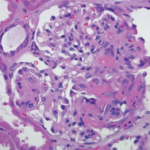
Vasculitis expert and former editor of The Rheumatologist Dr. Philip Seo gives us his picks for the most important abstracts in ANCA-asociated vasculitis from the International Vasculitis Workshop 2024.
The 21st International Vasculitis Workshop, held in Barcelona in April 2024, reviewed advances in diagnostic tools, assessment methods and treatment options for the small-vessel vasculitides. This article highlights important points regarding the treatment of ANCA-associated vasculitis and IgA vasculitis.
1. Abatacept for relapsing, non-severe GPA.
Abstract O-008: Langford et al.1
Although most patients with granulomatosis with polyangiitis (GPA) will enter remission with standard immunosuppressive therapies, relapse is common. Approximately half of patients with GPA will flare within three years of their initial diagnosis.2 Patients with non-severe GPA may have an even higher rate of relapse than patients initially diagnosed with the life-threatening form of this disease.
Abatacept is a monoclonal antibody directed against cytotoxic T-lymphocyte associated protein-4 (CTLA-4) commonly used for the treatment of rheumatoid arthritis. Langford et al. explored the utility of abatacept as a treatment for patients with relapsing, non-severe GPA.
In this study, 65 patients with relapsing, non-severe GPA were randomized to receive treatment with weekly subcutaneous abatacept 125 mg or a placebo in combination with a 12-week glucocorticoid taper. Equal numbers of patients in both groups experienced relapse or worsening disease (62% vs. 68%, P=0.255). Treatment with abatacept did not impact time to full remission, duration of glucocorticoid-free remission relapse severity, prevention of damage, patient-reported quality of life or adverse events.
Relapsing, non-severe GPA is particularly challenging to treat, and differentiating disease activity from damage and infection is not straightforward. Even under the best of circumstances, it can be difficult to prove that an intervention is efficacious for this population. This study cools enthusiasm for abatacept as a treatment for GPA. Notably, it does not exclude the possibility that abatacept may still be useful for patients newly diagnosed with GPA or other specific subpopulations.
2. Impact of plasma exchange on early renal improvement in ANCA-associated vasculitis.
Abstract O-010: Odler et al.1
Plasma Exchange and Glucocorticoids in Severe ANCA-Associated Vasculitis (PEXIVAS), a multi-center, randomized controlled trial of 704 patients with severe ANCA-associated vasculitis, failed to demonstrate that plasma exchange led to a reduction in the incidence of death or end-stage kidney disease.3 However, a subsequent meta-analysis, which included data from PEXIVAS, indicated that plasma exchange does reduce the risk of end-stage kidney disease at 12 months.4 However, the mechanism underlying this observation has been unclear.
This post hoc analysis of data from the PEXIVAS trial demonstrates that patients who received plasma exchange had a greater improvement in estimated glomerular filtration rate during the first two months of therapy, when compared with patients who did not receive plasma exchange. After two months, the rates of renal recovery were equivalent in both groups. Early improvements in kidney function (i.e., at four weeks) correlated with a lower risk of kidney failure within one year (relative risk 0.96, 95% confidence interval 0.95–0.97).
The meta-analysis examining plasma exchange’s impact on the risk of end-stage kidney disease among patients with ANCA-associated vasculitis has been criticized for including predominantly older studies, which may not reflect the current standard of care. However, this subgroup analysis supports the meta-analysis’s findings, indicating that plasma exchange may promote early recovery of kidney function, leading to an overall improvement in long-term prognosis. Faster resolution of glomerulonephritis may also underlie the improved kidney outcomes seen in patients with ANCA-associated vasculitis treated with avacopan.5 It is notable, however, that the key observation regarding the long-term risk of kidney failure just barely reached statistical significance, and it is not clear from this study whether these benefits extend beyond one year.
3. Hypogammaglobulinemia in patients with ANCA-associated vasculitis on rituximab.
Abstract O-101: Rathmann et al.1
Rituximab is now commonly used for both remission induction and remission maintenance for patients with ANCA-associated vasculitis. However, prolonged exposure to rituximab is associated with an increased risk of common variable immunodeficiency (CVID), in which hypogammaglobulinemia leads to an increased risk of infection.
The present study identified 84 patients in southern Sweden who received rituximab for treatment of an ANCA-associated vasculitis. The incidence rate of hypogammaglobulinemia was 16.1 per 100 person-years. Hypogammaglobulinemia developed a median of 3.5 months following treatment with rituximab. Patients with low levels of IgG at baseline were more likely to develop hypogammaglobulinemia following treatment with rituximab.
For two-thirds of these patients, the hypogammaglobulinemia was mild, with an IgG level of at least 4.9 g/L. Additionally, only five patients developed severe infection associated with hypogammaglobulinemia.
This study demonstrates that although hypogammaglobulinemia is common among patients with ANCA-associated vasculitis treated with rituximab, it is typically mild and is generally not associated with serious infection. However, the researchers could not identify novel risk factors associated with severe hypogammaglobulinemia. It would have been helpful to have these data stratified by the total number of rituximab doses received, which is likely not easily ascertained from this data set. Also, although the risk of progression to CVID in this study was low, because it is irreversible, we still need evidence-based strategies to minimize the risk of developing CVID in patients who may require prolonged therapy with rituximab.
4. EGPA & interleukin-5 blockade.
Abstract O-046: Wechsler et al.1
Mepolizumab is the only agent approved by the U.S. Food & Drug Administration (FDA) for the treatment of eosinophilic granulomatosis with polyangiitis (EGPA). MANDARA was a phase 3, randomized controlled trial that randomized 140 patients with relapsing or refractory EGPA to one year of treatment with either benralizumab 30 mg or mepolizumab 300 mg. Both drugs were administered subcutaneously on a monthly basis.
MANDARA demonstrated that benralizumab was non-inferior to mepolizumab for achieving remission at weeks 36 and 48 (59% vs. 56%). However, MANDARA defined remission as a Birmingham Vasculitis Activity Score (BVAS) of 0 and an oral glucocorticoid dose of no more than 4 mg daily. The present study is a post hoc analysis that endeavored to determine if the results might have differed if a more stringent definition of complete remission had been used (i.e., BVAS of 0 and no oral glucocorticoids at weeks 36 and 48). Sustained complete remission was defined as patients who achieved complete remission by week 48 and remained in complete remission by the end of week 52.
Using these new definitions, a greater proportion of patients treated with benralizumab achieved both complete remission (23.5% versus 11.1%) and sustained complete remission (35.7% versus 22.9%) compared to patients treated with mepolizumab.
Mechanistically, benralizumab is more efficient at eliminating eosinophils than mepolizumab. It is, therefore, not surprising that benralizumab was also more efficient at achieving a glucocorticoid-free remission. Importantly, this post hoc analysis highlights that most patients with EGPA treated with IL-5 blockade (either benralizumab or mepolizumab) will continue to require chronic therapy with glucocorticoids, albeit at low doses.
5. Rituximab in Adult-Onset IgA Vasculitis.
Abstract O-084: Triviol et al.1
IgA vasculitis (formerly Henoch Schonlein purpura) is widely considered refractory to immunosuppressive therapies, including cyclophosphamide. Multiple attempts have been made to explore the utility of rituximab for the treatment of IgA vasculitis, with mixed results.
This retrospective study reviewed the kidney response of patients with IgA vasculitis treated with rituximab. Approximately two-thirds of patients had relapsing disease. Most patients also received treatment with glucocorticoids and 15% also received cyclophosphamide.
At six months, 85% of patients were in remission, defined as a BVAS less than three, and 89% of patients with glomerulonephritis demonstrated evidence of improvement. Relapse occurred in 29% of patients a median of 13 months following treatment with rituximab.
The pattern of disease response and flare follows the expected time course for B cell depletion and repletion following rituximab therapy, which implies that these patients are responding to treatment with rituximab. An open question is why a consistent message regarding the efficacy of IgA vasculitis has not emerged from the literature, and whether the benefits noted in this study will persist past six months.
Another interesting observation from this study is that crescentic IgA nephropathy, which is indistinguishable pathologically from the crescentic glomerulonephritis of IgA vasculitis, is less likely to respond to treatment with rituximab and more likely to relapse. These differences imply these are pathophysiologically distinct diseases, despite their similarities.
Philip Seo, MD, MHS, is an associate professor of medicine at Johns Hopkins University School of Medicine. He served as the third physician editor of The Rheumatologist.
Author’s note
The 22nd International Vasculitis Workshop will be hosted by the Australia and New Zealand Vasculitis Society on Feb. 21–25, 2026, in Melbourne, Australia.
References
- Abstracts book, version 3. 21st International Vasculitis Workshop. 2024 Apr 5. https://zenodo.org/records/11068008
- Pagnoux C, Hogan SL, Chin H, et al. Predictors of treatment resistance and relapse in antineutrophil cytoplasmic antibody–associated small-vessel vasculitis. Arthritis Rheum. 2008 Sep; 58(9): 2908–2918.
- Walsh M, Merkel PA, Peh CA, et al. Plasma exchange & glucocorticoids in severe ANCA-associated vasculitis. N Engl J Med. 2020 Feb;382(7):622–631.
- Walsh M, Collister D, Zeng L, et al. The effects of plasma exchange in patients with ANCA-associated vasculitis: An updated systematic review and meta-analysis. 2022 Feb:376:e064604.
- Jayne DRW, Merkel PA, Schall TJ, et al. Avacopan for the treatment of ANCA-associated vasculitis. N Engl J Med. 2021 Feb;384(7):599–609.

